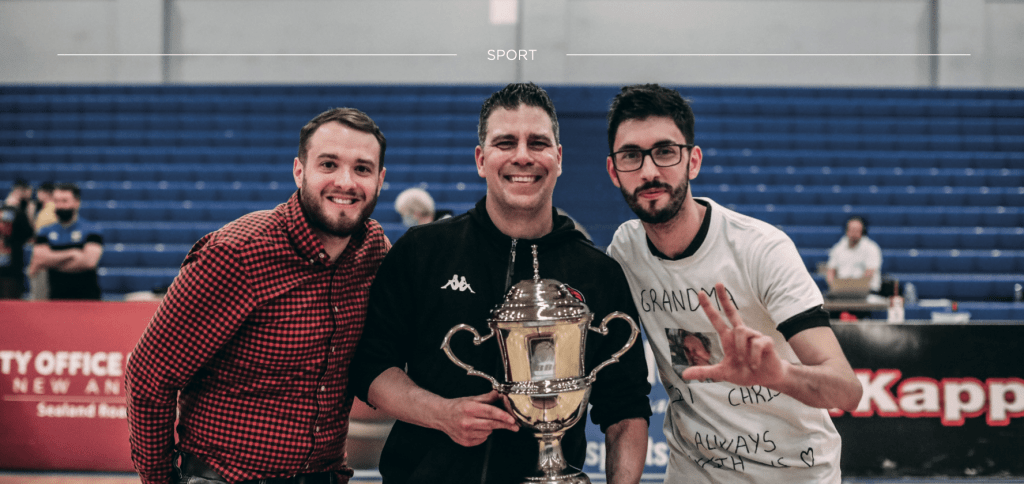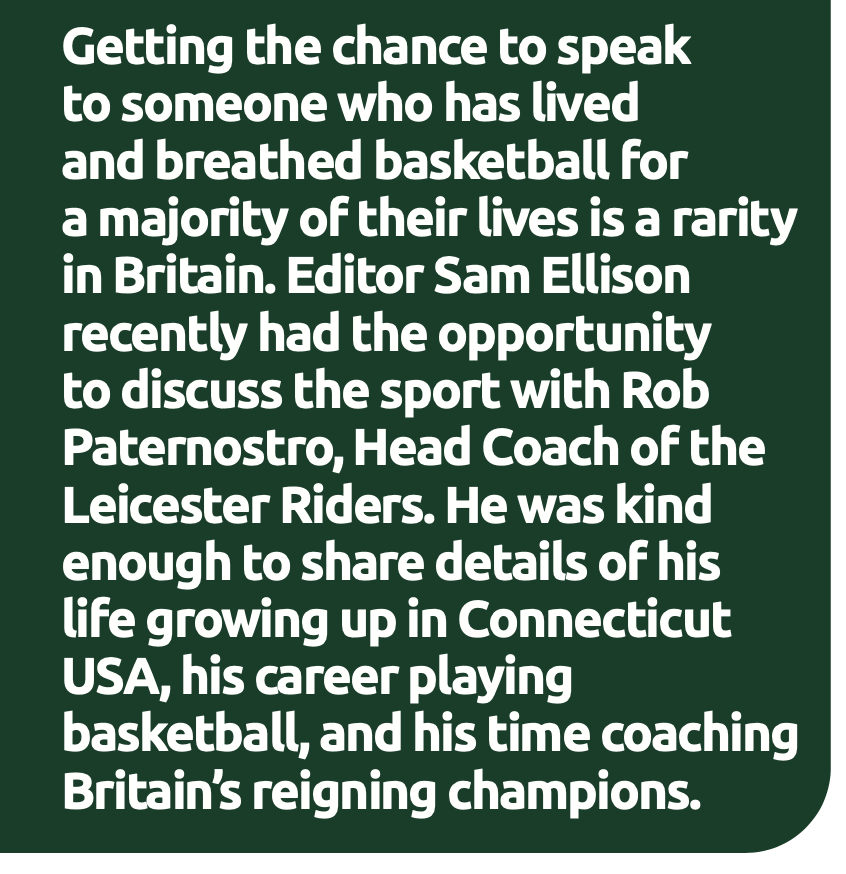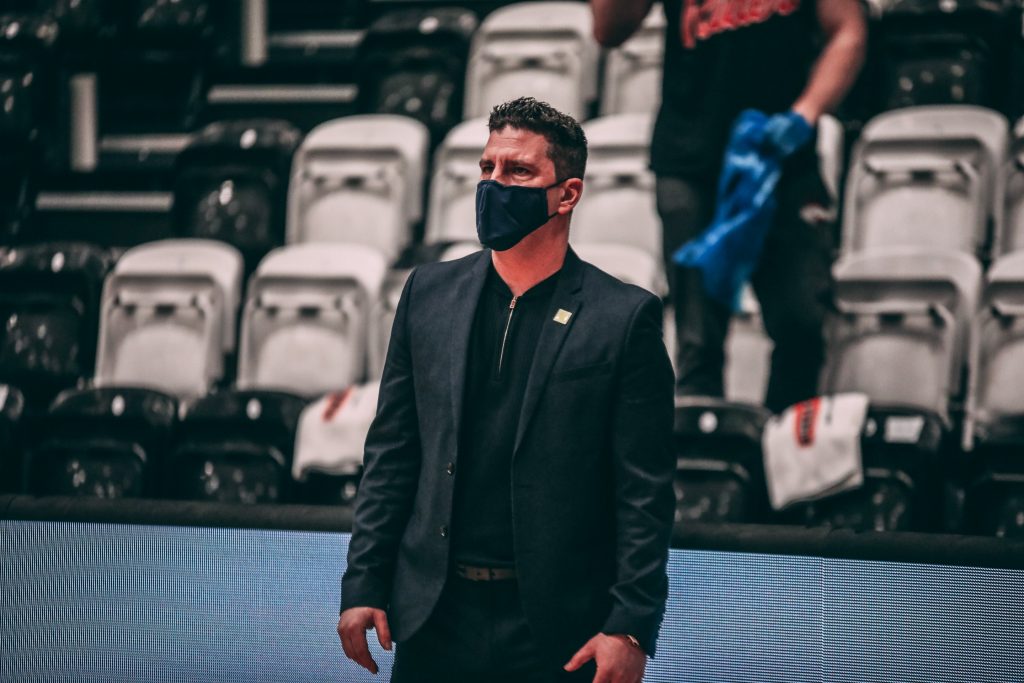

Growing up in the city of Waterbury, and fathered by an Italian immigrant, Rob’s life was heavily influenced by the Italian culture. His father was also dedicated to the world of sport and this love was quickly passed down to Rob. Interestingly, it wasn’t basketball that first took root in his mind. Baseball was the one that invoked his passion. “My dad was a baseball player and that’s really where it all started. From a young age I would go with my dad when he was playing at night, and I remember being enamoured with being around the team. I can remember being on the bench with his team and being so excited when they won, and so upset when they lost! That was really the start of it all. My dad was such a huge influence on me loving the game and I picked up pretty much everything after that. I played baseball, soccer, basketball, tennis, golf—it was my life from an early age. There was nothing else I wanted to do.”
Rob had a very successful time playing sports in highschool. His positive career led to offers to play at university and ultimately he chose basketball. “I chose this for financial reasons, ultimately. Southern New Hampshire University (SNHU) offered me a full scholarship. The best part about playing for this University is we won a lot. Ya know, when you’re losing, nobody says hello to you. When you’re winning, you’re getting high fives up and down the hallway! We had 107 wins and 24 losses during my four years there. So… that was a lot of high fives.”
A man that Paternostro speaks highly of is the Southern New Hampshire basketball coach, Stan Spirou. With a 33- year career, Spirou hit a whopping 640 victories over a total of 981 games. Championed as a legendary basketball coach he evidently had a profound impact on Rob’s life and career. “He was a huge influence.” said Rob. “Stan was wonderful. He pushed me hard as a coach and is still a close, close friend to this day and is loved dearly for everything he did for me. Watching him coach and watching him with his family— everything he was doing alongside basketball has had a big influence on me as a person.”
After his success playing for the SNHU Penmen team, the challenge of getting to the big leagues was astronomical. “There weren’t many other options back then,” said Rob. “There were no minor leagues or anything like that. If you didn’t make it to the NBA you went overseas. After my college career, I bounced around all over the world. I got myself a European agent and played in countries like Austria, Greece, Italy, Spain—it was awesome! This was before the internet was easily accessible so when I was traveling to a new place I had no idea what I was getting into, bar the things I could read in magazines or an encyclopedia. That was the best part about that experience though. The knowledge of different cultures and the experience of true independence in a foreign land. It was pretty dramatic; there was no option to facetime anybody or watch movies to pass the time. Once you got into your room wherever you were staying, you just had to embrace the culture. It was a real challenge!”
At the age of 27, Rob had decided that he’d had enough of the fun yet intensely-hectic lifestyle of playing basketball all around Europe. He moved back to the US where he quickly managed to net a job at the sports network, ESPN. “It was only about 15 minutes away from where I grew up. I had some contacts there, and then boom: all of a sudden I’m working at ESPN on the NBA show. It was a really exciting time. Because they knew of my basketball background, I was fast tracked into the world of the NBA. It tends to take the regular person a little bit longer to get into that but my experience paid off. I was analysing games, working with NBA coaches and players and that was where I first got a taste for coaching.”
After a year working at ESPN, Paternostro got a phone call from a former agent, asking if he wanted to play again. After some contemplation, he put the late nights and long hours of working at a national network to one side and accepted the offer.
“I said yes. And it was Birmingham, England.” said Rob. “I had a friend who played in the BBL from Connecticut who told me I’d love it, and that I’d do really well. I signed with the Birmingham Bullets and played for them for four years. I had such a great time and played for a few teams, including Leicester for some years after that.”

In 2007, Rob retired from play once again, and had settled in England. He received a call from Dan Routledge, broadcaster and son of the Leicester Riders Chairman, who offered him a job as the team’s head coach. At this time however, he had just got a job as a P.E teacher in Birmingham. “I was enjoying my new job so I didn’t want to throw that away. So I worked both! In the day I worked at school teaching sport to young people, and in the evenings I was driving to Leicester for training. That first year was a wild ride but fortunately we had great success. We finished third, which was the highest in their history at the time. I was named Coach of the Year and after that I dropped my teaching job and moved up to Leicester. We put together some really good, really competitive seasons in the early days. But we finally broke though in 2012 with a fantastic roster. We signed one of the best British players ever, Drew Sullivan. He was really impressed with what we were doing and once we were able to pick him up we started to really roll. We made it to the final that year, won some trophies the next year and kept getting better and better.”
The Riders’ growing success attracted more and more fans to games. This snowball effect drew in bigger and better talent to, not just the team, but the management of the club too. “We had people like Russell Levenston join us.” said Rob, talking about the team’s General Manager. “We were all really hungry for success. We built that from the ground up and it’s something we’re all really proud of. Now, we’re situated in the fantastic Morningside Arena, and when you look around during a game, everyone’s wearing a Riders sweatshirt. That feels really good because we know where we’ve come from!”
There are still challenges ahead for the team. Securing funding is a constant concern. “We have to spend time finding new sponsors and finding new ways to be creative.” said Rob. “But the most important thing during this journey is the players. Finding the right players, not just talent-wise, but with great personalities and competitiveness is pivotal. We have been so fortunate though. When I look back at the roster I’m just amazed at the talent that has passed through our doors.”
British Basketball is in a better position than it has ever been now. The opportunity for it to grow even further in popularity is ripe for the taking. With great individuals like Rob Paternostro behind it, it could only be a matter of time before this sport gets the national recognition it deserves.



